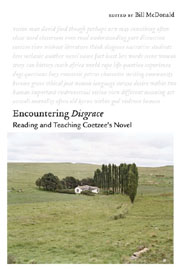Book contents
- Frontmatter
- Contents
- Acknowledgments
- Introduction
- I Reading Disgrace
- 1 “We are not asked to condemn”: Sympathy, Subjectivity, and the Narration of Disgrace
- 2 Beyond Sympathy: A Bakhtinian Reading of Disgrace
- 3 “Is it too late to educate the eye?”: David Lurie, Richard of St. Victor, and “vision as eros” in Disgrace
- 4 Disgrace and the Neighbor: An Interchange with Bill McDonald
- 5 To Live as Dogs or Pigs Live Under Us: Accepting What's on Offer in Disgrace
- 6 Tenuous Arrangements: The Ethics of Rape in Disgrace
- 7 Dis(g)race, or White Man Writing
- 8 Clerk in a Post-Religious Age: Reading Lurie's Remnant Romantic Temperament in Disgrace
- 9 Saying it Right in Disgrace: David Lurie, Faust, and the Romantic Conception of Language
- 10 The Dispossession of David Lurie
- II Reading Disgrace with Others
- Works Cited
- Notes on the Contributors
- Index
2 - Beyond Sympathy: A Bakhtinian Reading of Disgrace
from I - Reading Disgrace
Published online by Cambridge University Press: 12 September 2012
- Frontmatter
- Contents
- Acknowledgments
- Introduction
- I Reading Disgrace
- 1 “We are not asked to condemn”: Sympathy, Subjectivity, and the Narration of Disgrace
- 2 Beyond Sympathy: A Bakhtinian Reading of Disgrace
- 3 “Is it too late to educate the eye?”: David Lurie, Richard of St. Victor, and “vision as eros” in Disgrace
- 4 Disgrace and the Neighbor: An Interchange with Bill McDonald
- 5 To Live as Dogs or Pigs Live Under Us: Accepting What's on Offer in Disgrace
- 6 Tenuous Arrangements: The Ethics of Rape in Disgrace
- 7 Dis(g)race, or White Man Writing
- 8 Clerk in a Post-Religious Age: Reading Lurie's Remnant Romantic Temperament in Disgrace
- 9 Saying it Right in Disgrace: David Lurie, Faust, and the Romantic Conception of Language
- 10 The Dispossession of David Lurie
- II Reading Disgrace with Others
- Works Cited
- Notes on the Contributors
- Index
Summary
We are invited to understand and sympathize. But there is a limit to sympathy.
— David Lurie to students in his “The Romantics” course in DisgraceDostoevsky says “it is simply not good enough to look in your heart and write, that what comes out, when you write is quite as likely to be some self-serving lie as it is to be the ruthless truth about yourself.” … [M]y sympathy is wholly with Dostoevsky.
— J. M. Coetzee in an interview with Eleanor Wachtel, Brick 67 (2001), 45At david lurie's feet, the crippled dog Driepoot “sits up, cocks its head, listens” to the sound of the banjo, and in response to Lurie's humming voice “smacks its lips and seems on the point of singing too, or howling” (Disgrace, 215). Earlier, Lurie has asked himself: “Why pretend to be a chum when in fact one is a murderer?” (143), and yet at the end of the novel, bearing the crippled dog in his arms, “giving it what he no longer has difficulty in calling by its proper name: love” (219), Lurie escorts Driepoot to annihilation. As Driepoot's “period of grace is almost over; soon it will have to submit to the needle” (215), there seems to be no other choice for Lurie but to relieve Driepoot of the suffering he'll surely endure as a homeless, crippled animal in a township teeming with neglected dogs. But, perhaps, Lurie hastens the end of Driepoot's period of grace, refusing to “save the young dog … for another week” (219).
- Type
- Chapter
- Information
- Encountering 'Disgrace'Reading and Teaching Coetzee's Novel, pp. 48 - 63Publisher: Boydell & BrewerPrint publication year: 2009



